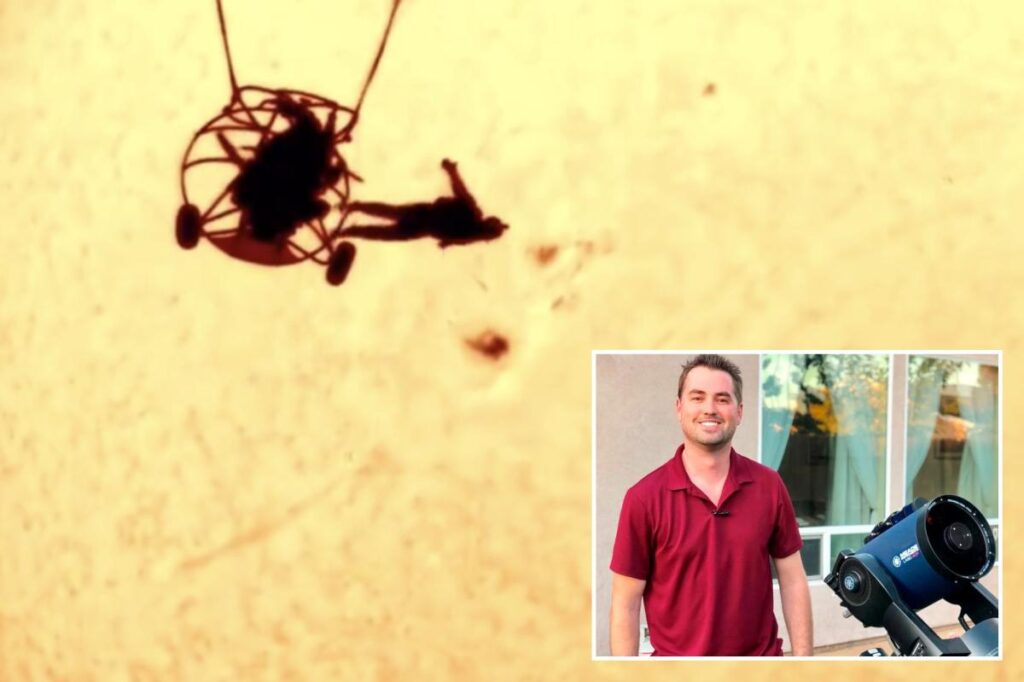An Arizona-based astrophotographer has pulled off what may be an unprecedented feat in photography: capturing a skydiver in free fall perfectly aligned with the surface of the sun.
Andrew McCarthy, who specializes in solar photography, coordinated with friend and YouTube personality Gabriel C. Brown to create the striking image on Nov. 8 in the Arizona desert.
The photo, titled “The Fall of Icarus,” required months of planning, complex mathematics and six attempts before the pair nailed the shot.
“This might be the first photo of it’s kind in existence,” McCarthy wrote on X, calling it “absolutely preposterous (but real).”
The project, which demanded extraordinary precision, required Brown to jump from a small propeller-powered aircraft at approximately 3,500 feet while McCarthy positioned himself roughly 8,000 feet away with an array of telescopes, according to PetaPixel.
“We had to find the right location, time, aircraft, and distance for the clearest shot; while factoring in the aircraft’s power-off glideslope for the optimal sun angle and safe exit altitude,” Brown explained on Instagram.
“Then we had to align the shot using the opposition effect from the aircraft and coordinate the exact moment of the jump on three-way comms!”
The technical challenges extended beyond the jump itself.
McCarthy monitored a live feed from his desert location and radioed Brown when to leap.
The narrow field of view meant lining up the aircraft with the sun took six passes before Brown could finally jump.
“It was a narrow field of view, so it took several attempts to line up the shot,” McCarthy told Live Science.
“We only had one shot at the jump as repacking the parachute safely would take too long for another.”
The biggest obstacle proved to be tracking the aircraft through the sky — far more difficult than McCarthy anticipated despite his extensive experience photographing the sun.
What makes the image particularly remarkable is McCarthy’s use of hydrogen-alpha light to capture the sun’s chromosphere — the fiery outer atmosphere invisible in normal white light.
Hydrogen-alpha is a type of red light given off by hydrogen gas in the sun’s atmosphere.
Special filters that block out all other light except this specific red wavelength reveal the sun’s fiery surface details that normal photography can’t capture — providing the dramatic backdrop for Brown’s silhouette.
After capturing Brown’s transit, McCarthy created a high-resolution mosaic of the entire sun using a separate telescope, then matched the features to create the final composite image.
“It exceeded my expectations,” McCarthy said in an Instagram video.
Footage from the shoot shows his excitement at the moment of capture: “I got it, dude!” he shouts.
McCarthy later described the photo as one of the “top 5” he has ever taken over the course of his career.
Brown, who had previously completed two paramotor transits of the moon with another photographer, brought valuable experience to the project.
“I had already done two paramotor transits of the moon (with @photographerjon) so I had experience getting similar shots & had a pretty good idea of the optimal angle & coms requirements,” Brown wrote on X.
“But the sun was a lot harder!”
The skydiver expressed his elation after the successful shoot.
“This is REAL (and I can’t BELIEVE we pulled it off)!” Brown wrote on X.
“It took months of planning and a stupid amount of math, but I couldn’t be happier with the result! Best skydive of my life!”
Read the full article here


